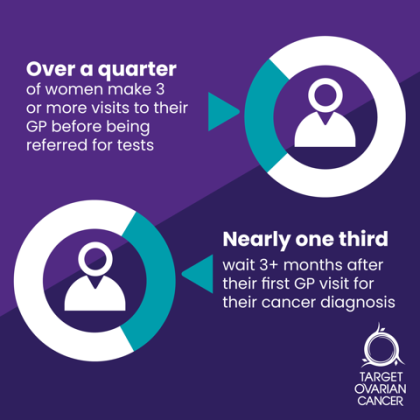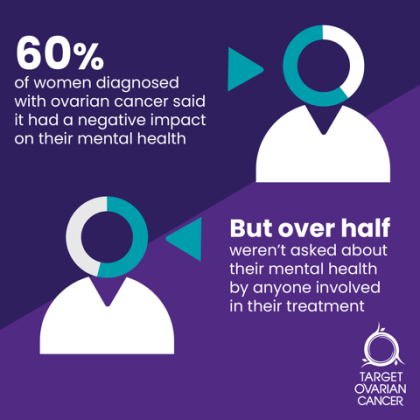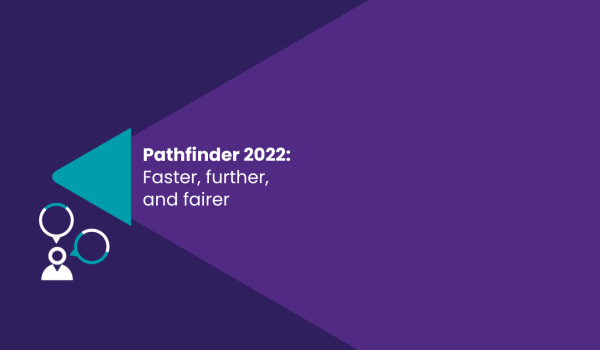Women with ovarian cancer are still being overlooked. Diagnosis is happening too late, access to treatment is limited and the provision of support is not good enough. This must change.
Pathfinder 2022: Faster, further, and fairer
Today we have published the findings of our latest state-of-the-nation report, Pathfinder 2022: Faster, further, and fairer. This report shows that although there have been significant improvements over the years, that there remains not enough progress in diagnosis, awareness, treatment and support, and that more needs to be done.
The report reveals that:
-
Just one in five (21 per cent) of women know that bloating is one of the key symptoms of ovarian cancer
-
Over a quarter of women make three or more visits to their GP before being referred for tests and nearly a third wait over three months from first visiting their GP for the correct diagnosis
-
14 per cent of women reported that they were not told their diagnosis in private
-
60 per cent of those with a diagnosis of ovarian cancer reported it had a negative impact on their mental health, but the research showed that 54 per cent of respondents hadn’t been asked by anyone involved in their treatment about the impact on their mental health
-
Only 23 per cent of women surveyed reported that they were asked if they would like to join a clinical trial, despite 60 per cent reporting they would like to

We know that progress is possible if urgent action is taken now.
We’re demanding national symptoms awareness campaigns and more training and support for GPs, which will lead to earlier diagnosis of ovarian cancer, access for all to treatment, widespread improvements in support, notably mental health support, as well as an urgent investment in the Clinical Nurse Specialist workforce.
Stand together with us by writing to your MP today.
The report tells us that if diagnosis was faster, further support was available and access to treatment was fairer, there could be potential for more women to survive, live well with ovarian cancer and be supported from diagnosis and throughout treatment.

Annwen Jones OBE, Chief Executive of Target Ovarian Cancer, said:
While there has been some improvement in recent years, our report clearly shows that we now need action taken to secure progress which is faster, further and fairer. We are hopeful that with the right targeted investment and backing from the government we can achieve this together, prolonging and saving lives.
Since our last Pathfinder report in 2016, we have worked tirelessly to transform the lives of those living with ovarian cancer, despite the setbacks of the pandemic. We have achieved the first government-funded national symptoms awareness campaign and the first national ovarian cancer audit, and we have seen the introduction of groundbreaking new treatments like PARP inhibitors and wider genomic testing.
Progress is possible, but Pathfinder demonstrates that these improvements are not enough. Ovarian cancer is not going away. We can change the course of this disease.
Shared experiences
Many people have been sharing their experiences with us. Together, we all want to see change happen. One person backing our demands is Mo Easton, pictured here with her daughter and granddaughter.
Mo said:
Seven years ago, I had symptoms of ovarian cancer but didn’t realise. I didn’t know at the time that the bloating, abdominal pain, feeling full and needing to wee more urgently were all signs. I had multiple visits to the GP before I found out I had ovarian cancer and it was advanced. Before this, due to chronic constipation, I was even told that I might have IBS – something very rarely diagnosed in the 50+. I later found out I did have ovarian cancer and it was advanced.
I was diagnosed with high grade serous ovarian cancer stage III. The consultant said, ‘you have incurable ovarian cancer and you’ll be on palliative care until you die’. This is why it is really important to me that I speak to everyone about ovarian cancer and its symptoms.
Ovarian cancer doesn’t feel known. Many of us aren’t aware of the symptoms. We need to get this knowledge out there and help people to understand the disease, as this might mean people receive an earlier diagnosis.
If you’ve been affected by this story and would like to speak to a specialist nurse, you can call our dedicated support line on 020 7923 5475 or contact us: [email protected]. We're open from 9am until 5.30pm, Monday to Friday.
If reading this story has helped you, join the Ovarian Cancer Community to connect with more people affected by ovarian cancer: www.targetovariancancer.org.uk/onlinecommunity



